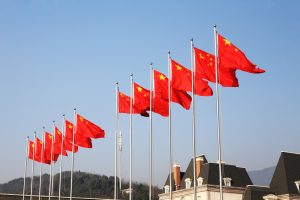China won’t sell weapons to either side in the war in Ukraine, the country’s foreign minister said Friday, responding to Western concerns that Beijing could provide military assistance to Russia.
China has maintained that it is neutral in the conflict, while backing Russia politically, rhetorically, and economically at a time when Western nations have imposed punishing sanctions and sought to isolate Moscow for its invasion of its neighbor.
Qin Gang is the highest-level Chinese official to make such an explicit statement about arms sales to Russia. He added that China would also regulate the export of items with dual civilian and military use.
“Regarding the export of military items, China adopts a prudent and responsible attitude,” Qin said at a news conference alongside visiting German counterpart Annalena Baerbock. “China will not provide weapons to relevant parties of the conflict, and [will] manage and control the exports of dual-use items in accordance with laws and regulations.”
The minister also reiterated China’s willingness to help find a peaceful resolution to the conflict.
At the same news conference, Qin also blamed Taiwan’s government for heightened regional tensions after Beijing held large-scale military drills in an attempt to intimidate the island it claims as its own territory.
In February, Secretary of State Antony Blinken said the United States had intelligence suggesting China was considering providing arms and ammunition to Russia – and warned that such involvement in the Kremlin’s war effort would be a “serious problem.”
In recent days, European leaders have issued similar warnings, even as they visited China, and the European Union’s foreign policy chief lashed out at Beijing, saying its support of Russia during the invasion was “a blatant violation” of its United Nations commitments.
In her remarks, Baerbock also referred to China’s role as a permanent member of the United Nations Security Council, saying it bore a special responsibility for helping end the conflict.
“But I have to wonder why the Chinese positioning so far does not include a call for the aggressor, Russia, to stop the war,” she said. “We all know that President [Vladimir] Putin would have the opportunity to do so at any time, and the people in Ukraine would like nothing more than to finally be able to live in peace again.”
A visit to Moscow last month by Chinese leader Xi Jinping underscored how Beijing is increasingly becoming the senior partner in the relationship as it provides Russia with an economic lifeline and political cover. China announced Friday that Defense Minister General Li Shangfu would visit Russia next week for meetings with counterpart Sergei Shoigu and other military officials.
On both Ukraine and Taiwan, Qin articulated well-worn defenses of Chinese policies that underscore Beijing’s rejection of criticisms from the West, particularly the United States. Under the ardently nationalist Xi, China has sharpened its rhetoric, particularly on the issue of Taiwan, which split from mainland China amid civil war in 1949.
Tensions around the island rose significantly after China deployed warships and fighter planes near Taiwan last weekend in retaliation for a meeting between U.S. House Speaker Kevin McCarthy and Taiwanese President Tsai Ing-wen.
China insists that self-governing Taiwan submit to its rule, either peacefully or by force, and Qin said the pursuit of independence by Taiwan’s government and its foreign supporters – a veiled reference to chief ally the United States – were the reason for the tensions.
Baerbock warned that a conflict in the Taiwan Strait, through which much of the world’s international trade passes, would bring global disaster.
“We therefore view the increasing tensions in the Taiwan Strait with great concern,” she said. “Conflicts must be resolved peacefully. A unilateral change of the status quo would not be acceptable to us as Europeans.”
Apparently rejecting Baerbock’s concerns, Qin said Taiwan was “China’s internal affair.”
“Taiwan independence and peace cannot co-exist,” he said.

































